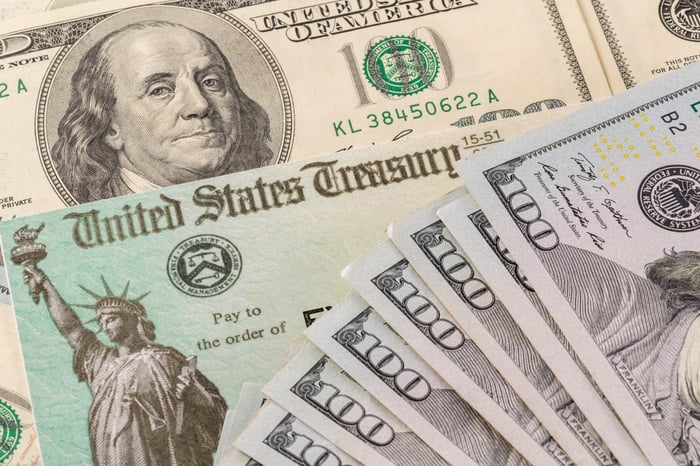Relief is on the way, or perhaps has already hit your checking account, according to the White House.
On Thursday, March 11, President Joe Biden signed the hotly debated latest coronavirus stimulus package into law. The $1.9 trillion relief bill bolsters weekly unemployment payouts by $300, provides $350 billion in state and local aid, and adds tens of billions to the coronavirus vaccination and distribution campaign already underway.
But let's make no mistake about it: The hero of this bill is the $1,400 stimulus checks making their way to well over 100 million Americans.

Image source: Getty Images.
Dividend stocks could help you generate massive income
For many, this $1,400 payout represents a financial lifeline that'll allow them to pay their rent or mortgage, cover utility bills, put food on the table, or perhaps add to an existing emergency fund. But for possibly tens of millions of other Americans who haven't been adversely affected by the pandemic and who have healthy emergency funds, their incoming $1,400 stimulus check might be best put to work in the stock market.
While growth stocks have been the clear-cut winning investment since the end of the Great Recession, it's dividend stocks that just might offer the more impressive long-term story. According to a report from J.P. Morgan Asset Management, public companies that initiated and grew their dividends between 1972 and 2012 generated average annual gains of 9.5% over this four-decade stretch. As for the non-dividend stocks, they averaged a paltry annualized gain of 1.6% over 40 years.
The results from this study shouldn't surprise anyone. Companies that regularly pay and grow their dividends are often profitable and have time-tested operating models.
The $64,000 question -- or should I say the $1,400 question -- is which dividend stocks to buy?
Ideally, investors want the maximum income possible with the least amount of risk imaginable -- in other words, the best of the best high-yield dividend stocks. If you're financially set and looking to put your stimulus check to work, the following four dividend stocks could be veritable money machines.

Image source: Getty Images.
Annaly Capital Management: 10.1% yield
If the sound of a ringing register gets you out of bed in the morning, then the 10.1% yield that accompanies mortgage real estate investment trust (REIT) Annaly Capital Management (NLY 1.71%) might be too delectable to ignore.
Mortgage REITs like Annaly are companies that borrow money at lower short-term rates and use it to purchase assets (e.g., mortgage-backed securities, or MBS) that provide a higher long-term yield. The difference between this higher long-term yield and the short-term borrowing rate is known as the net interest margin (NIM). Typically, mortgage REIT NIMs will expand as the yield curve steepens following a recession. You could rightly say that we're in the bread-and-butter portion of Annaly's growth spurt over the next couple of years.
What's more, Annaly Capital Management almost exclusively purchases agency securities. This means the MBS and other assets it purchases are backed by a federal agency in the event of a default. Though this added protection lowers the yield Annaly receives relative to non-agency securities, it also allows the company to safely use leverage to its advantage in order to pump up profits.

Image source: Getty Images.
Philip Morris International: 5.4% yield
Though not the growth story they once were, tobacco stocks can still comfortably pad the pockets of their shareholders. That's why tobacco stock Philip Morris International (PM -1.04%) can be counted on as a money machine by investors looking to invest their stimulus checks.
The interesting thing about Philip Morris is that it's exclusively focused on markets outside the United States. Even though it's encountering tougher marketing rules or regulations in a number of developed markets, it's also benefiting from burgeoning middle classes in developing and emerging countries. With a presence in more than 180 countries worldwide, Philip Morris is able to offset weakness in developed markets with growth from emerging markets and the strong pricing power associated with nicotine-containing products.
Philip Morris is also looking to the future. The company's IQOS heated tobacco system allows users to inhale nicotine without many of the other chemicals found in tobacco cigarettes. The company ended 2020 with an estimated 17.6 million IQOS users and saw heated tobacco unit shipment jump by almost 28% to 76.1 billion units. Expanding its sales channels beyond tobacco cigarettes should secure this 5.4% yield for a long time to come.

Image source: Getty Images.
IBM: 5.1% yield
Another potential big-time moneymaker for stimulus check recipients is tech stalwart IBM (IBM -0.72%). Though IBM has been stuck in the proverbial mud for much of the past decade, we're seeing key improvements in its underlying performance that should reignite growth and ensure it continues to pay out a hearty 5% yield.
The biggest issue with IBM is that it waited far too long to shift its focus to cloud computing. This left the company overly reliant on its legacy software solutions, which explains its multiyear sales decline.
However, IBM has not been shy about making bolt-on investments in the hybrid cloud and artificial-intelligence (AI) arena in recent years. After making seven cloud or AI investments in 2020, IBM reported a 19% increase in total cloud sales to $25.1 billion. More importantly, 34% of total sales last year were derived from its cloud solutions. Cloud margins absolutely trounce all of the company's other operating segments, so generating a larger percentage of total sales from cloud should lead to a big uptick in operating cash flow.
IBM also deserves credit for improving its margins at its legacy operations. By trimming costs, IBM has been able to juice its cash flow, even with declining revenue. This cash flow helps IBM undertake buybacks, pay its dividend, and make bolt-on acquisitions.

Image source: Getty Images.
AT&T: 6.9% yield
Finally, telecom giant AT&T (T 1.63%) can be an income machine for stimulus check recipients.
Like Philip Morris and IBM, AT&T's best days are now in the rearview mirror. But that doesn't mean Ma Bell doesn't have a few tricks up its sleeve to move the needle in the right direction.
For example, the rollout of 5G networks should be a significant positive for AT&T. It's been a decade since the last upgrade of wireless download speeds, which suggests that consumers and businesses will be jumping at the prospect of updating their wireless devices. Since AT&T generates its juiciest margins from wireless data, an increase in download speeds can only improve its operating margins.
AT&T also stands to benefit from its push into streaming. Despite a slow start to the launch of HBO Max in late May, AT&T's subscriber numbers have picked up significantly in recent months. This may have to do with subsidiary WarnerMedia releasing all of its movies in 2021 on HBO Max the same day they'll hit theaters. Offering exclusive content from the luxury of one's own couch could be the dangling carrot that puts HBO Max on the map.
With AT&T signaling numerous times that its dividend is safe, investors can comfortably count on this nearly 7% yield.





